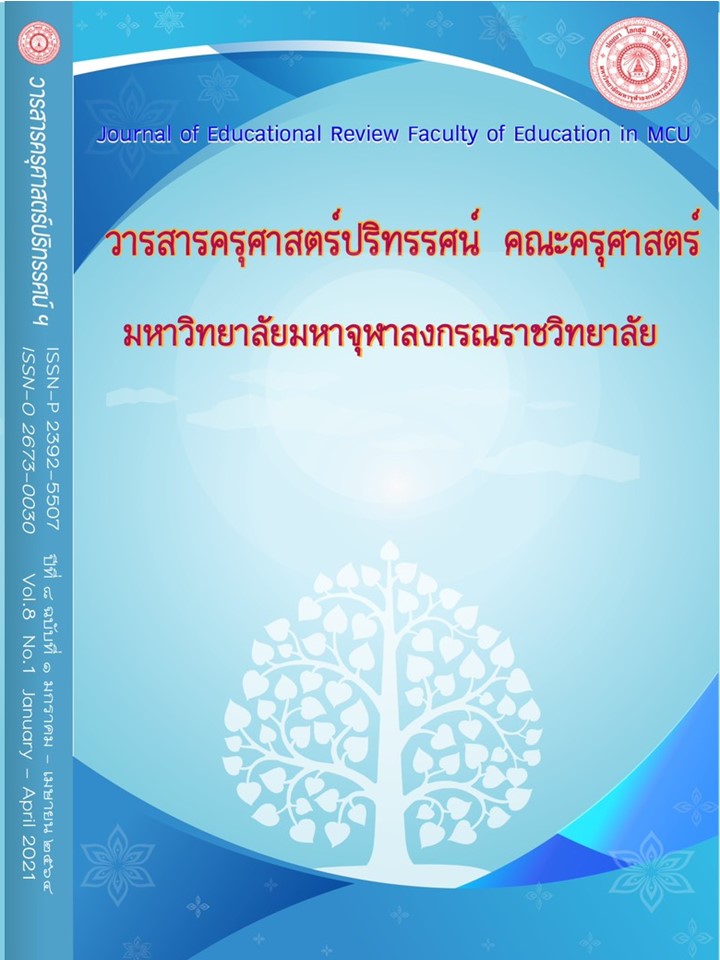THE ADMINISTRATIVE NETWORK DEVELOPMENT OF THAI MONASTIC GROUP IN EUROPE
Main Article Content
Abstract
The purpose of this research was to propose the administrative network development of Thai monastic group in Europe. Mixed methods research was designed and was divided into 3 steps consisted of Step1: Study of the state of administrative network of Thai monastic group in Europe by interview 10 key informants who selected by purposive sampling. Step 2: develop a network of administration of Thai monastic group in Europe using focus group discussion of 17 experts with purposive sampling. Step 3: examine and propose the administrative network development of Thai monastic group in Europe. The evaluation form was used for 58 European Abbots ministering in Europe. Statistical data were analyzed including frequency, percentage, mean and standard deviation. The results of the research found that the administrative network development of Thai monastic group in Europe consisted of 1) principles which were (1) development of a communication system between members to be convenient, fast, and accurate, (2) develop participation to give strength both internal and external members, (3) develop security to set the sustainable life of Thai monastic group, (4) adhere to the principles of discipline and law of the European Union. 2) The goal of building the unity of Thai monastic group in accordance with the motto that Buddhabut must be unified, like one sun, not sectarian, and focus on setting the target to work together. 3) The aim is to create a network in the performance of duties in 6 aspects of the ecclesiastical affairs, including the network of governance, religious education, educational welfare, Buddhist dissemination, public facilities, public welfare. 4) Development preparation, preparation before development, during development, and after development. 5) Development process which were (1) Buddhism principles, (2) network management approach, (3) development components, (4) context of Thai monastic group in Europe and 6) development evaluation, Cognitive evaluation, psychomotor domain assessment, and affective assessment.
Article Details
ทัศนะและความคิดเห็นที่ปรากฏในบทความในวารสารฉบับนี้ถือเป็นความรับผิดชอบของผู้เขียนบทความนั้นเพียงผู้เดียว และไม่ถือเป็นทัศนะและความรับผิดชอบของกองบรรณาธิการ
กองบรรณาธิการขอสงวนสิทธิ์ในการคัดเลือกบทความลงตีพิมพ์และจะแจ้งให้เจ้าของบทความทราบหลังจากผู้ประเมินบทความตรวจอ่านบทความแล้ว
ต้นฉบับที่ได้รับการตีพิมพ์ในวารสารครุศาสตร์ปริทรรศน์ คณะครุศาสตร์ มหาวิทยาลัยมหาจุฬาลงกรณราชวิทยาลัย ถือเป็นกรรมสิทธิ์ของคณะครุศาสตร์ มหาวิทยาลัยมหาจุฬาลงกรณราชวิทยาลัย ห้ามนำข้อความทั้งหมดหรือบางส่วนไปพิมพ์ซ้ำ เว้นเสียแต่ว่าจะได้รับอนุญาตจากมหาวิทยาลัยฯ เป็นลายลักษณ์อักษร
References
เกรียงศักดิ์ เจริญวงศ์ศักดิ์. (2545). การจัดการเครือข่าย: กลยุทธ์สำคัญสู่ความสำเร็จของการปฏิรูปการศึกษา. กรุงเทพมหานคร: ส.เอเชียเพลส.
บ้านจอมยุทธ์. (2562). การเผยแผ่และการนับถือศาสนาในทวีปยุโรป. แหล่งที่มา https://www.baanjomyut.com/library_2/extension-1/the_propagation_of_buddhism/02.html สืบค้นเมื่อ 1 มิ.ย. 2562
ประยูร อัครบวร, ไพฑูรย์ สินลารัตน์ และกมลทิพย์ ศรีหาเศษ. (2553). การสร้างเครือข่ายและการมีส่วนร่วม. กรุงเทพมหานคร: โรงพิมพ์แห่งจุฬาลงกรณ์มหาวิทยาลัย.
พระมหาโพธิวงศาจารย์. (2558). มุมมองการพัฒนาวัดไทยในสหภาพยุโรปในปัจจุบันและอนาคต. วารสารสหภาพพระธรรมทูตไทยในทวีปยุโรป (ส.ธ.ย.). 2. 41.
พระสมหมาย อตฺถสิทฺโธ. (2559). รูปแบบการนำหลักอปริหานิยธรรมไปใช้ในการบริหารของผู้บริหารสังกัดองค์การปกครองส่วนท้องถิ่น จังหวัดร้อยเอ็ด. ดุษฎีนิพนธ์พุทธศาสตรดุษฎีบัณฑิต. มหาวิทยาลัยมหาจุฬาลงกรณราชวิทยาลัย.
มหาวิทยาลัยจุฬาลงกรณราชวิทยาลัย. (2539). พระไตรปิฎกฉบับภาษาไทย ฉบับจุฬาลงกรณราชวิทยาลัย. กรุงเทพมหานคร: โรงพิมพ์มหาจุฬาลงกรณราชวิทยาลัย.
วารสารสหภาพพระธรรมทูตไทยในทวีปยุโรป. (2553). กำเนิดสหภาพพระธรรมทูตไทย. วารสารสหภาพพระธรรมทูตไทยในทวีปยุโรป (ส.ธ.ย.). 1(1). 13.
วิทยาลัยพระธรรมทูต. (2562). ทำเนียบวัดไทยในต่างประเทศ. แหล่งที่มา http://www.odc.mcu.ac.th/?page_id=31 สืบค้นเมื่อ 1 มิ.ย. 2562


